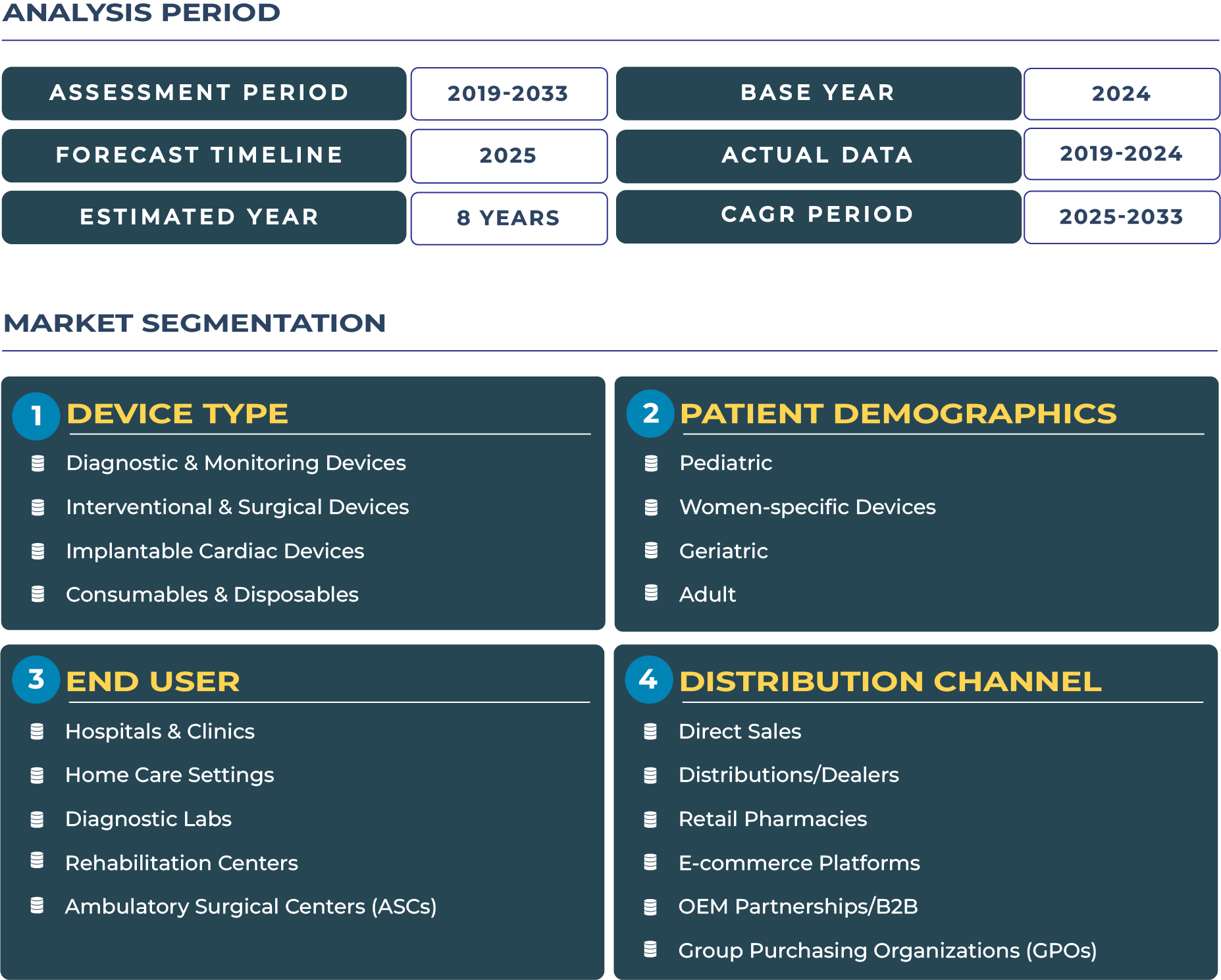Colombia Cardiovascular Devices Market Outlook and Growth Projections
The Colombia cardiovascular devices market is projected to increase from USD 164.4 million in 2025 to USD 493.6 million by 2033, recording a robust CAGR of 14.7%. This performance is supported by an expanding middle class, private hospital chains investing in implantable devices, and rising regional medical hub activity in Bogotá and Medellín. Increasing demand for consumables and disposables further underpins recurring revenue streams in the cardiovascular devices industry. Additionally, Colombia’s healthcare modernization strategies, coupled with growing insurance coverage and targeted infrastructure projects, will continue to reinforce sustained growth across the forecast period.
City Hub-Led Cardiac Innovation: How Colombia’s Urban Ecosystem is Reshaping the Cardiovascular Devices Market
Colombia is rapidly becoming one of Latin America’s most dynamic cardiovascular care markets, with major city hubs such as Bogotá and Medellín steering modernization. The cardiovascular devices market in Colombia is closely tied to the expansion of private hospitals, the rise of digital healthcare pilots, and growing demand for advanced diagnostic and surgical solutions. Urban health ecosystems, supported by private investment and medical tourism, are setting the pace, while regional medical hubs are creating new opportunities for interventional cardiology and consumables. These shifts illustrate how Colombia is evolving into a market where city-first strategies and private partnerships drive accelerated adoption of cardiovascular technologies.
Urban Healthcare Transformation Defining Colombia’s Cardiovascular Devices Industry
The cardiovascular devices sector in Colombia is experiencing a powerful transformation driven by city-centric healthcare investments. Bogotá remains the epicenter of cardiovascular modernization, with private hospitals adopting implantable cardiac devices, interventional surgical tools, and digital monitoring systems that improve chronic care management. Medellín, with its growing reputation as a medical hub, is following closely with investments in private clinics and specialized cardiology centers. Economic stability, combined with targeted government health reforms, has reinforced private sector confidence, spurring large-scale hospital upgrades and modernization projects. However, regional disparities remain evident, as rural and smaller urban centers lag behind in access and affordability. Political and security-related challenges occasionally disrupt the healthcare delivery chain, but overall resilience in the private hospital ecosystem ensures Colombia’s cardiovascular devices landscape remains growth-focused, resilient, and city-first in orientation.
Drivers & Restraints: Understanding the Dynamics Shaping Colombia’s Cardiovascular Devices Ecosystem
Expanding Private Hospitals and a Rising Middle Class Fueling Market Momentum
A key driver of the Colombia cardiovascular devices market is the expansion of private hospitals in Bogotá and Medellín, which are setting new standards for cardiac care delivery. With a rising middle class increasingly seeking quality healthcare, demand for implantable cardiac devices and interventional procedures is rising sharply. Colombia’s growing reputation in medical tourism is another accelerator, with international patients turning to urban cardiology centers for affordable, specialized treatments. Additionally, the adoption of telemedicine in urban ecosystems is strengthening post-operative monitoring and chronic disease management, cementing the role of digital solutions in Colombia’s cardiovascular ecosystem.
Infrastructure Gaps and Reimbursement Variability Limiting Market Potential
Despite rapid urban adoption, the cardiovascular devices sector in Colombia continues to face critical constraints. Infrastructure gaps in rural and semi-urban areas limit access to advanced diagnostic and interventional services. Moreover, variability in reimbursement frameworks complicates affordability for many patients, particularly those outside major cities. Security challenges in specific regions can also disrupt supply chains, delaying delivery of cardiovascular consumables and surgical devices. These restraints highlight the dual-speed nature of the Colombian healthcare landscape, where city hubs thrive, but peripheral areas lag in adoption and access.
Trends & Opportunities: Emerging Pathways Defining Colombia Cardiovascular Devices Market
Urban Private Clinic Expansion and Telemedicine Acceleration
A prominent trend in the Colombia cardiovascular devices industry is the accelerated growth of private clinics in Bogotá and Medellín. These facilities are investing heavily in advanced interventional and diagnostic devices, further enhancing their ability to serve both domestic and international patients. Simultaneously, the integration of telemedicine solutions is bridging the gap for rural populations, particularly in follow-up care and monitoring for chronic cardiac conditions. Demand for consumables such as catheters, surgical stents, and disposables is surging, creating strong recurring demand within the cardiovascular devices ecosystem.
Private Partnerships and Export-Oriented Opportunities
Significant opportunities lie in forming strategic partnerships with private hospitals in Bogotá, Medellín, and Cali, which are early adopters of advanced cardiovascular technologies. Telco partnerships offer additional opportunities to expand remote monitoring pilots, strengthening digital health infrastructure. Colombia’s strategic location also enables potential export opportunities for regional device distribution, positioning the country as a future hub for cardiovascular device supply chains across Latin America. For manufacturers and suppliers, a city-first commercialization strategy remains the most viable route for success in this market.
Competitive Landscape: Strategies Redefining Market Competition in Colombia’s Cardiovascular Devices Sector
The Colombia cardiovascular devices landscape is increasingly defined by collaborations between multinational leaders and local distributors. Companies such as Boston Scientific and Medtronic have strengthened their foothold by partnering with private hospital chains in Bogotá and Medellín. Key developments include cardiology unit upgrades in Bogotá private hospitals (2024) and pilot telehealth programs in Medellín to enhance chronic disease management. Local distributors play a vital role in ensuring device availability across the country, particularly for consumables and disposables. Training initiatives for healthcare professionals and urban-centered commercialization remain central strategies, positioning multinational players to capture Colombia’s rapidly expanding urban cardiovascular devices market.







